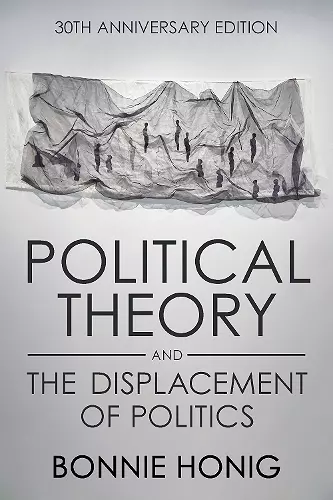Political Theory and the Displacement of Politics
Format:Hardback
Publisher:Cornell University Press
Published:15th Mar '23
Currently unavailable, and unfortunately no date known when it will be back
This hardback is available in another edition too:
- Paperback£27.99(9781501768446)

Political Theory and the Displacement of Politics, originally published in 1993, has been called a founding text of agonism, which treats political contestation not as a regrettably necessary way to correct political imperfections but as a necessary, sometimes joyful feature of democratic life. As Bonnie Honig writes in the preface to this thirtieth anniversary edition, "the agonism that informs this book is democratic: it is committed to shared spaces and relational practices in which diverse groups and individuals set and reset the terms of living together as equals."
By rethinking the established relation between politics and political theory, Honig argues that political theorists of opposing positions often treat political theory less as an exploration of politics than as a series of devices for its displacement. She characterizes Kant, Rawls, and Sandel as virtue theorists of politics, arguing that they rely on principles of right, rationality, community, and law to protect their political theories from the conflict and uncertainty of political reality. Drawing on Nietzsche and Arendt as well as Machiavelli and Derrida, Honig instead explores an alternative politics of virtú, which treats the disruptions of political order as valued sites of democratic freedom and individuality.
Bonnie Honig concludes the introduction to this fine book by invoking the virago: the female warrior who will not be contained within categoriesthat oppose masculinity against femininity or human rationality against theforces of nature. It is a fitting emblem for a book that takes up and perturbs an opposition that functions variously to divide reason from violence, liberal humanism from poststructuralist skepticism, and feminine passivity from masculine bravado. This is the opposition between virtú and virtue, and Honig calibrates it against a new measure she terms the 'displacement of politics.'. (Praise for the 1st edition)
* Political Theory *Honig's sharp genealogical sensibilities and insights, her development of a position of agonistic amendable authority, the questions which she raises and the soothing answers she refuses, come together in an excellent book that engages and provokes its readers in ways which exemplify political theory at its best, animated but not displaced by politics. (Praise for the 1st edition)
* Journal of Politics *Thinkers as diverse as Plato, Aquinas, Hobbes, Locke, and Marx have relied,explicitly or implicitly, on the belief that there is some set of political and social arrangements most conducive to themaximization of human well-being and happiness. Bonnie Honig's illuminating and disquieting book provides an acute and much-needed analysis of some of the consequences and implications of this teleological assumption for contemporary political theory and, more generally, for the ways in which people tend to conceive of politics. Indeed, Honig argues that politics itself, at least insofar as it entails or expresses ultimately irreducible conflict, dissonance, resistance, and agonal struggle, has largely been displaced from or written out of political theory. (Praise for the 1st edition)
* American Quarter- Winner of Foundations of Political Theory Section First Book Award 1994 (United States)
- Winner of Guggenheim Fellowship 2023 (United States)
ISBN: 9781501768439
Dimensions: 229mm x 152mm x 27mm
Weight: 907g
300 pages
30th Anniversary Edition